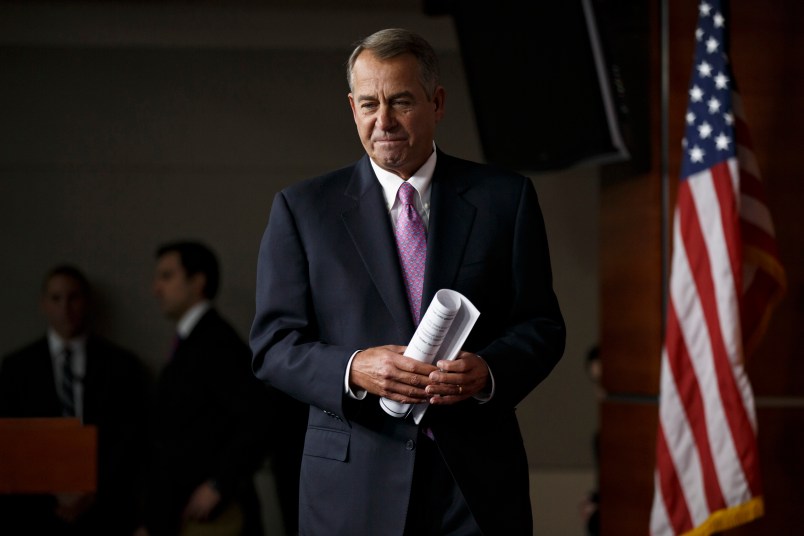This story has been updated.
Wrapped inside House GOP leaders’ proposal to extend the debt ceiling was a subtle concession that the days of debt limit extortion were over.
But on Tuesday morning, they abandoned even that. A Republican source in the room during a meeting confirmed to TPM that “we will be bringing up a ‘clean’ debt limit bill tomorrow. [Speaker John] Boehner made clear the GOP would provide the requisite number of Republican votes for the measure but that Democrats will be expected to carry the vote.”
The proposal that surfaced Monday evening, only to be ditched by Tuesday morning, was as bipartisan as it comes: the plan reversed recently enacted cuts to military retirement benefits, which both parties overwhelmingly support. It’s paid for by extending the mandatory sequestration cuts to Medicare providers for an extra year, which Democrats have also supported.
The military cost-of-living adjustments in the Ryan-Murray budget deal could be undone at a later date. A standalone bill to do just that moved forward in the Senate by a vote of 94-0 on Monday. The only question is whether that’ll happen in conjunction with — or independently from — raising the country’s borrowing authority.
It became clear Tuesday morning what many suspected all along: House Republicans don’t have nearly enough votes to pass their debt ceiling bill on their own, and the debt limit bill will pass with Democratic support. Reps. Devin Nunes (R-CA) and Mo Brooks (R-AL) admitted as much to reporters in the Capitol after a special conference meeting on Monday evening. Many hard-right members don’t want to vote for any borrowing limit hike.
“Doing it on the debt ceiling is just playing games with our military retirees,” said a House Democratic leadership aide on Monday.
Rep. Jeff Duncan (R-SC) made his opposition known in dramatic fashion. “How about you talk to my son and tell him about the debt that he’s going to pay,” he said. Flashing his phone at TPM, he raised his voice: “$17.3 trillion right now. … He’s a Clemson student. I’d be glad for you to explain how he’s going to pay that back.”
So the debate is all procedural and cosmetic. Both parties’ leaders insist that default is not an option. Republicans wanted to package the two in order to save some face and claim they “got” something for raising the debt limit. Democrats wanted to do them separately in order to adhere to their insistence on “clean” debt limit hikes — no strings attached, no threats to default, no hostage-taking of the economy by the party out of power. It’s now clear that Democrats won that debate.
Additional reporting by Daniel Strauss.






